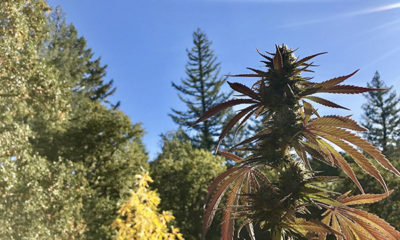
Joint Opinions
Cannabis Blamed for America’s Mass-Shooting Epidemic
A disgraced conspiracy theorist’s junk theories are gaining traction among America’s fringe right-wing: Cannabis is somehow behind the country’s epidemic of mass shootings.
Another week, another mass shooting to blame on cannabis. Six days after an 18-year-old who’d just bought two AR-15-style rifles on his birthday murdered 19 fourth graders and two teachers at an elementary school in Uvalde, TX, Fox News host Laura Ingraham asked her roughly 2.2 million viewers whether the real problem wasn’t actually cannabis legalization.
“Why aren’t people in general not talking more about the pot-psychosis violent-behavior connection?” asked Ingraham, who added that anyone advocating gun-control measures—such as the 90% of Americans who support universal background checks—as a rational response to Uvalde are “completely oblivious to what the legalization of marijuana has done and is doing to an entire generation of Americans with violent consequences.”
At first blush, injecting cannabis into the conversation over mass shootings seemed like a fresh spin, another effort at misdirection to steer the conversation toward “hardening” schools, or arming teachers or vague jeremiads about “mental health”—anything but a discussion about the easy availability of weapons or that particular weapon, the AR-15-style rifle, the instrument of choice in a mass-shooting in Buffalo the week before that claimed another ten innocent lives.
But, in fact, Ingraham lifted her screed nearly verbatim from the Substack account of disgraced COVID conspiracy theorist Alex Berenson, a former reporter at The New York Times turned novelist turned multi-purpose conservative contrarian. Berenson noticed a post-publication change to a Times item that initially reported an acquaintance’s claim that the Uvalde shooter was mad that his grandmother “didn’t let him smoke weed or do what he wanted.”
That detail later disappeared from the story, which for Berenson was evidence of… well, not much, aside for more support for his pet theory. “Cannabis causes psychosis,” as he wrote. “Psychosis causes violence,” he added, including, an unmistakable syllogistic link, mass shootings.
It’s a serious charge, that’s also completely unserious. Serious observers have already roundly dismissed this fresh demonization of cannabis. Nonetheless, it’s gaining new life as conservative commentators and politicians embrace cannabis as a method to stoke grievance in America’s ongoing culture war.
Rebirth of a Notion
Before he became known as the COVID-19 pandemic’s “wrongest man” and got himself kicked off Twitter for claiming vaccines were worthless (or, actually, dangerous), Berenson’s angle was being a cannabis legalization contrarian. In pursuit of this chimera, he peddled an anti-legalization polemic that, according to a mass letter signed by 100 researchers in 2019, used “flawed pop science and ideological polemics” to “promote some of the worst myths about people of color and people with mental illness”—including the idea, unsupported by science, that cannabis makes them violent.
In serious circles, such as the researchers and clinicians who signed onto the letter labeling Berenson’s theories as worthless warmed-over garbage left over from the Just Say No era, the idea that cannabis legalization is connected to America’s mass-shooting epidemic is laughed out of the room.
But Ingraham’s appropriation of Berenson’s exploded theories set off a chain reaction in the right-wing media echo chamber, where, along with virulent transphobia, cannabis is being tested out as a front in the culture war.
On June 6, the conservative Wall Street Journal’s even more conservative editorial page said that, if it were true that the Uvalde shooter smoked weed—an enormous, Hollywood-sign-sized “if”—“it would fit a pattern.”
“Mass shooters at Rep. Gabby Giffords’s constituent meeting in Tucson, AZ (2011); a movie theater in Aurora, CO (2012); the Pulse nightclub in Orlando (2016); the First Baptist Church in Sutherland Springs, TX (2017); and Marjory Stoneman Douglas High School in Parkland, FL (2018) were reported to be marijuana users,” the WSJ opined. “It could be a coincidence, but increasing evidence suggests a connection.”
(It bears mentioning that most of those shooters were also AR-15-style rifle users, but that, surely, is a coincidence.)
The Missing Link
In addition to noting that the main link between mass shooters wasn’t that they used weapons but that they smoked weed, Allysia Finley, the piece’s author, cited a few studies in her argument. This included a meta-analysis, published in The American Journal of Psychiatry in May 2020, that tried to investigate an association between youth and “the risk of perpetuating physical violence.” That meta-analysis, led by researchers in Canada—where, just for funsies, cannabis was legalized nationwide in 2018—found a “moderate association between cannabis use and physical violence.”
The study’s authors didn’t immediately respond to a request for comment from Cannabis Now on how their work is currently being used to steer American attention away from gun control—which is much stricter in Canada than in the US, and which has legalized cannabis, and which doesn’t seem to be gripped by the same mass shooting epidemic.
On June 13, the conservative Washington Examiner hopped on the bullshit train, adding its own fresh load of trash to the pile. “One way to reverse growing rates of violent crime,” posed the newspaper’s editorial board, using most of the same arguments as the Journal, “may be to recriminalize the use of marijuana.”
Though violence absolutely surged during the COVID-19 pandemic, on the aggregate, the US hasn’t been this peaceful for decades. Violent crime, as Pew Research found, dropped 49% between 1993—right around when New York City launched a decade-long war on joints—and 2019, by which time more than a dozen states had legalized adult-use cannabis. In fact, a 2018 study found that the rates of certain crimes dropped in areas that had recently legalized cannabis.
You could just as easily (and more convincingly) argue that legalization has made the US more peaceful. That at least might be a little more honest, if a little naive, as the causes of violence are known to be complex, an overlapping web of material circumstances.
Political Quackery
Rather than grapple with the broader set of facts or engage with skeptics, the conservative echo-chamber is sealing itself off. In a letter to The Wall Street Journal’s editorial board that the newspaper didn’t print, Paul Armentano, the deputy director of the National Organization for the Reform of Marijuana Laws, pointed out a slew of other studies, including a data analysis from the RAND Corporation that tried to find a link between cannabis dispensaries and crime—and failed to do so.
“Claims that cannabis use causes violence are frankly absurd when you consider that there are tens of millions of regular cannabis consumers in the US who have never engaged in any violent activity and there have been no conclusive studies showing an association between violence and either cannabis use or its legalization,” said Morgan Fox, NORML’s political director, in a statement provided to Cannabis Now.
“Cherry-picking anecdotal instances and pretending that they represent a ‘disturbing trend’ when the experiences of legal cannabis markets here and abroad say otherwise is just the newest iteration of a long-used tactic by unscrupulous prohibitionists to demonize this substance and the people that use it,” he added. “Such assertions are pure political quackery, and an attempt to distract from the real issues at hand as well as the overwhelming successes that states have achieved by regulating cannabis.”
So far, it doesn’t seem like Berenson’s shameless recycling of his increasingly dusty conspiracy theory is making much headway among the US public. But as mass shootings and dead children continue to pile up, and opponents of gun reform seek any other sacrificial lamb other than reasonable restrictions on who can own an AR-15, cannabis is taking another familiar turn in the barrel.
























